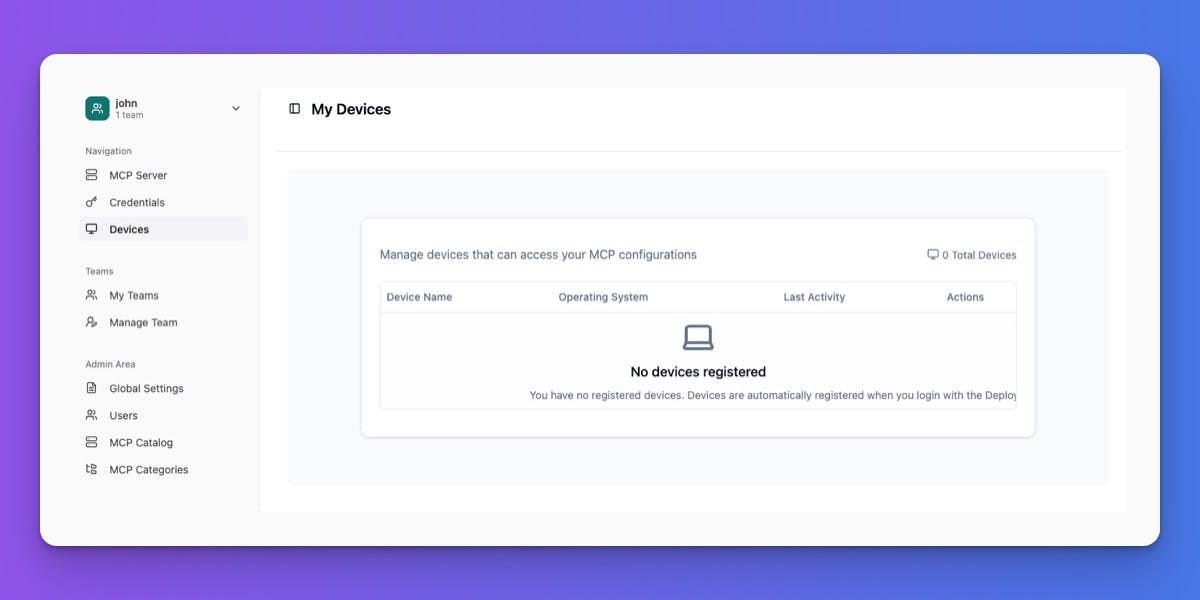Smart MCP Configuration System + Critical Device Management Fixes

Table of Contents
Menu. Currently selected: The Big Change: Three-Tier MCP Configuration
We've completely redesigned how MCP servers are configured in DeployStack and fixed critical device management issues that were causing duplicate device records and performance problems.
The Big Change: Three-Tier MCP Configuration
We introduced a smart configuration system that automatically handles different types of settings, making team collaboration much easier and eliminating repetitive setup work.
The Problem We Solved
Previously, when your team installed an MCP server, everyone had to configure the same settings individually:
- Repetitive Setup: Every team member manually entered the same API keys and shared folders
- Configuration Drift: Team members often had slightly different settings, causing compatibility issues
- Manual Credential Sharing: Sensitive API keys had to be passed around manually
- Update Headaches: When shared settings changed, everyone had to update individually
The Solution: Three Configuration Tiers
We now automatically organize settings into three levels:
1. Template Settings - Core technical settings that never change (server commands, installation methods)
2. Team Settings - Shared across your team:
- Shared API keys (OpenAI, GitHub, database credentials)
- Common resources (project folders, team documentation paths)
- Standardized policies that ensure consistent team experience
3. Personal Settings - Individual to each person:
- Local file paths (Desktop, Documents, project workspace)
- Personal preferences (debug settings, memory locations)
- Device-specific configurations (work laptop vs. home computer)
Real-World Example
Your team uses an MCP server for GitHub integration:
- Template: Server installation and basic setup (automatic)
- Team: Company GitHub token, shared repositories, coding standards
- Personal: Your local code directory, personal GitHub username, editor preferences
When you join the team, you instantly get company repository access with the right permissions, but code still goes to your preferred local folder.
Critical Fixes We Made
Fixed Hardware Fingerprinting Bug
The Problem: Our hardware fingerprinting algorithm was generating different IDs for the same machine, creating duplicate device records and breaking device identification.
Root Causes:
- Network MAC addresses processed in random order
- Non-deterministic JSON serialization
- Timestamp-based fallback logic made fingerprints completely random
The Fix: Made fingerprint generation completely deterministic:
- Sort MAC addresses before processing
- Use consistent JSON serialization with sorted keys
- Remove timestamps from fallback logic
- Add stable system properties for reliable identification
Result: Same machine now always generates the same hardware ID, eliminating duplicate devices.
Performance Improvements
The Problem: Gateway was making multiple API calls to build MCP configurations, causing slow loading times.
The Fix: Created a single backend endpoint that merges all three configuration tiers:
- GET `/api/gateway/me/mcp-configurations?hardware_id={hardwareId}`
- Returns fully merged, ready-to-use configurations
- Automatic device lookup using hardware fingerprints
- Configuration status indication
Performance Gain: Reduced from 3+ API calls to 1 call per configuration refresh.
What This Means for You
For Team Administrators
- Set Once, Use Everywhere: Configure team settings once, they apply to all team members automatically
- Centralized Management: Update shared API keys in one place instead of asking everyone to update individually
- Better Security: Sensitive credentials managed centrally with encryption
- Consistent Experience: All team members get the same base configuration
For Team Members
- Faster Setup: Join a team and get pre-configured MCP servers instantly
- Personal Control: Customize settings that matter to you without affecting the team
- Multiple Devices: Different personal configs for work laptop, home computer, etc.
- Automatic Updates: Team changes flow to you automatically
For Everyone
- No More Config Errors: Eliminates configuration mismatches and missing settings
- Better Collaboration: Everyone works with the same shared resources
- Simpler Maintenance: Updates happen at the right level automatically
- Reliable Device Management: No more duplicate device records or login issues